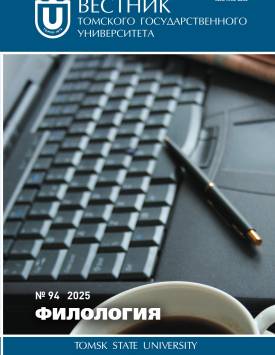There is always a choice: Alternative possible events in the narrative as a theoretical problem
Fictional narrative is traditionally considered by narratologists from the point of view of events that actually occurred within the storyworld, but at the same time includes events that could only happen. In other words, it assumes the existence of alternative possible scenarios. Classical narratologists (Tzv. Todorov, K. Bremond, R. Barthes) have also paid attention to this feature of narrative logic, but this type of eventfulness in the narrative has been studied much less often. The article examines the mechanisms of functioning of alternative versions of events in the narrative. Thus, alternatives can be presented by the narrator, the hero, or fall to the share of the reader's imagination. They can also have a different narrative scope: they can be omitted, implicit, explicit, or even expanded into a separate storyline. Depending on these criteria, different mechanisms of functioning of alternatives are distinguished: embedded narratives (describing desires, intentions, fantasies, etc. of heroes), virtual events ("still possible" events), disnarration (indications of events on behalf of the narrator or hero that could only have happened, but did not happen), denarration (events that occurred, but then refuted), alternarration (events presented according to the principle of "either, or"), counterfactual narratives (alternatives deployed in separate storylines). Alternative scenarios can be included in the structure of the narrative, but they can also function at the level of reader interaction with it: in this case, we can talk about "replotting" (playing alternatives in the reader's imagination), about stimulating counterfactual and optional thinking of the reader. Each of the mechanisms in the article is considered on separate literary and cinematic examples, but this does not exhaust the problem of the functioning of alternatives in the narrative. On the contrary, the mechanisms considered allow us to raise new questions: whether such events can be included in the fabula and under what conditions; how the functioning of alternatives in literary narratives of different eras changes; whether it is possible to talk about the media specificity of such events - whether their functioning in literature differs from other types of narratives, for example, cinematic. Consideration of alternative scenarios makes it possible to present the narrative progression in a different way in the narrative and to reconsider the reader's complicit interaction with it. The author declares no conflicts of interests.
Keywords
narrative alternatives,
virtual narrative,
virtual voice,
disnarration,
denarration,
counterfactual narrative,
replotting,
alternate possible worldsAuthors
| Shulyatyeva Dina V. | HSE University | dshulyatyeva@hse.ru |
Всего: 1
References
Бремон К. Логика повествовательных возможностей // Семиотика и искусствометрия. М., 1972. С. 108-135.
Барт Р. Введение в структурный анализ повествовательных текстов // Зарубежная эстетика и теория литературы XIX-XX вв.: трактаты, статьи, эссе. М., 1987. С. 387-422.
Ryan M.-L. Possible Worlds // The living handbook of narratology. Hamburg : Hamburg University, 2019. URL: http://www.lhn.uni-hamburg.de/article/possible-worlds (дата обращения: 15.05.2024).
Рикер П. Время и рассказ. М. ; СПб. : Университетская книга, 1998. Т. 1. 313 с.
Morson G. Narrative and Freedom: the Shadows of Time. New York ; London : Yale University Press, 1996. 336 p.
Ryan M.-L. Possible worlds, artificial intelligence, and narrative theory. Bloomington : Indiana University Press, 1991. 291 p.
Prince G. Disnarre / Disnarrated // Glossaire du RёNaFю 2018. URL: https://wp.unil.ch/narratologie/2018/12/disnarre-disnarrated/(дата обращения: 15.05.2024).
Chaudhuri S. The Rhetoric of Choice // Disnarration: The Unsaid Matters. Hyderabad : Orient Blackswan, 2016. 188 p.
Lambrou M. Disnarration and the Unmentioned in Fact and Fiction. London : Palgrave Pivot London, 2019. 126 p.
Lambrou M. La La Land: Counterfactuality, Disnarration and the Forked (Motorway) Path // Rethinking Language, Text and Context: Interdisciplinary Research in Stylistics in Honour of Michael Toolan. London : Routledge, 2018. P. 29-42.
Prince G. Remarques sur le topos et sur le denarre // La Naissance du roman en France. Paris-Seattle-Tubingen : Biblio 17, Papers on Seventeenth Century Literature, 1990. P. 113122.
Richardson B. Denarration in Fiction: Erasing the Story in Beckett and Others // Narrative. 2001. Vol. 9, № 2. P. 168-175.
Ryan M.-L. Virtuality // Critical Terms in Futures Studies. Cham : Palgrave Macmillan, 2019. P. 335-341.
Dannenberg H. Virtuality in Narrative Fiction // Diss. Sense. Zeitschrift fur Literatur und Philosophy, 1998. URL: http://www.dissense.de/vi/dannenberg.html (дата обращения: 15.05.2024).
Милич С.М. Виртуальный нарратив как повествовательная альтернатива // Narratorium. 2017. № 1 (10). uRL: https://narratorium.ru/2018/04/03/%D1%81%D0%BD%D0%B5%D0%B6%D0%B0%D0%BD%D0%B0-%D0%BC%D0%B8%D0%BB%D0%BE%D1%81%D0%B0%D0%B2%D0%BB%D0%B5%D0%B2%D0%B8%D1%87-%D0%BC%D0%B8%D0%BB%D0%B8%D1%87/(дата обращения:15.05. 2024).
Grishakova M.Interface Ontologies: On the Possible, Virtual, and Hypothetical in Fiction // Possible Worlds Theory and Contemporary Narratology. Lincoln: University of Nebraska Press, 2019. P. 88-110.
Bruner J. Actual Minds, Possible Worlds. Cambridge, Massachusetts : Harvard University Press, 1986. 222 p.
Dannenberg H. Coincidence and Counterfactuality: Plotting Time and Space in Narrative Fiction. Lincoln : University Of Nebraska Press, 2008. 304 p.
Prince G. L’Alternarre // Strumenti Critici. 1989. № 4. P. 223-231.
Frank W. «Alternarre», «denarre», «disnarre» : reflexions a partir d’exemples contem-porains // Cahiers de Narratologie. 2020. URL: http://journals.openedition.org/narratologie/10641.
Prince G. The Disnarrated // Style. 1988. Vol. 22, № 1. P. 1-8.
Изер В. Процесс чтения: феноменологический подход // Современная литературная теория: антология / сост. И.В. Кабанова. М., 2004. С. 201-224.
Gerrig R.J. Experiencing Narrative Worlds: On the Psychological Activities of Reading. New Haven ; London : Yale University Press, 1993. 273 p.
Sternberg M. Universals of Narrative and Their Cognitivist Fortunes (I) // Poetics Today. 2003. Vol. 24, № 2. P. 297-395.
Baroni R. La Tension narrative. Suspense, curiosite et surprise. Paris : Seuil, 2007. 456 p.
Kukkonen K. Probability Designs: Literature and Predictive Processing. New York : Oxford University Press, 2020. 225 p.
Suddendorf T., Corballis M. Mental time travel across the disciplines: The future looks bright // Behavioral and Brain Sciences. 2007. Vol. 30, № 3. P. 335-345.
Fludernik M. An Introduction to Narratology. London : Routledge, 2009. 200 p.
Аристотель и античная литература / под ред. М.Л. Гаспарова. М. : Наука, 1978. 230 с.

